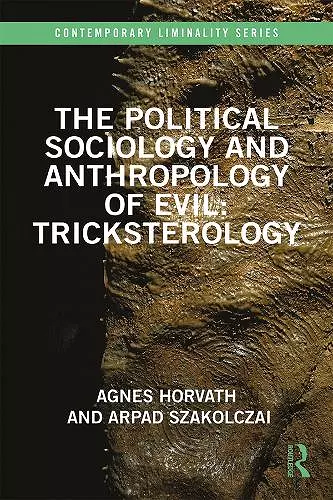The Political Sociology and Anthropology of Evil: Tricksterology
Arpad Szakolczai author Agnes Horvath author
Format:Hardback
Publisher:Taylor & Francis Ltd
Published:15th Oct '19
Currently unavailable, and unfortunately no date known when it will be back
This hardback is available in another edition too:
- Paperback£41.99(9781032088105)

This book offers a new approach to the problem of evil through an examination of the anthropological figure of the ‘trickster’. A lesser known and much more recent term than evil, the authors use the trickster to facilitate a greater understanding of the return of evil in the modern era. Instead of simply opposing ‘good’ and ‘evil’, the figure of the trickster is used to pursue the trajectories of similarities and quasi-similarities through imitation.
After engaging with the trickster as presented in comparative anthropology and mythology, where it appears in tales and legends as a strange, erratic outsider, the authors seek to gain an inside perspective of trickster knowledge through an examination of mythology and the classical world, including both philosophers and poets. The book then goes on to trace the trickster through prehistory, using archaeological evidence to complement the diverse narratives. In this way, and by investigating the knowledge and customs surrounding evil, the authors use the figure of the trickster to provide an unprecedented diagnosis of the contemporary world, where external, mechanical rationality has become taken for granted and even considered as foundational in politics, economics, and technologised science. The authors advance the idea that the modern world, with its global free markets, mass mediatic democracy and technologised science, represents a universalisation of trickster logic. The Political Sociology and Anthropology of the Evil will be of interest to scholars working in the fields of social theory, political anthropology and political sociology, as well as those interested in the ways in which evil can infiltrate reality.
"Because evil is a term fraught with religious overtones, it tends to be undertheorized in our largely secular contemporary culture. Yet something like evil continues to exist, arguably more forcefully today than ever, so the authors of this timely and important book assert. They argue boldly that understanding the continued presence of evil in the modern world requires reconceiving evil through the mythical figure of the trickster, a cross-cultural symbol that represents the perennial temptation to ignore the inherent limits of human thought and action. A wide ranging study that draws on multiple disciplinary sources, Horvath and Szakolczai illustrate forcefully how contemporary efforts to maximize productivity across all sectors of our social order violates the ethos of limits, and only liberates further the forces of destruction. In an age of increasingly mindless (and therefore runaway) processes, we would do well to heed the message of this significant study."- Gilbert Germain, Professor of Political Thought at the University of Prince Edward Island, Canada
"A complex and timely meditation on the nature of evil in human societies, reaching back into the distant past – while not all will agree with its methods or conclusions, this book offers provocative ideas for consideration by anthropologists, philosophers, and culture historians." - David Wengrow, Professor of Comparative Archaeology, University College London, UK
"This book offers an original and thought-provoking engagement with a problem for which we still lack adequate perspectives: the disastrous experience of advanced modernity with what we can provisionally call demonic power." - Johann Arnason, Emeritus Professor of Sociology, La Trobe University, Australia
"Horvath and Szakolczai provide a remarkable service in bringing the neglected figure of the trickster into the spotlight. This is a book to be recommended and savoured as a fillip to the sociological imagination today."- Chris Rojek, Professor of Sociology, City University of London, UK
ISBN: 9781138312142
Dimensions: unknown
Weight: 453g
224 pages